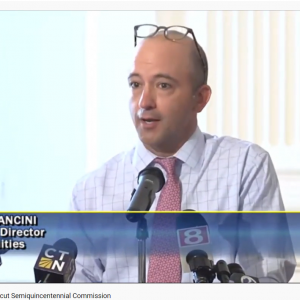CT Humanities was named in the executive order establishing the Connecticut Semiquincentennial Commission and will be an integral part of the initiative.
Dr. Jason Mancini, executive director at CT Humanities, spoke at today’s signing at CT’s Old State House:
Back in March 2020, CT Humanities convened a group at the CT Historical Society to begin thinking about America 250 and Connecticut’s role in the birth of our Nation.
Then a global pandemic hit the pause button on the process.
Despite that, we’ve not stopped forging ahead. We’re so grateful to Governor Lamont and his team for creating a commission to guide our work. The commission will work to acknowledge our storied revolutionary-era history and the subsequent 250 years. I hope that we will also lay the cornerstone for imagining Connecticut’s future.
Our past and our future ARE entwined. We build from Connecticut’s centuries-long civic tradition that has inspired and informed the rights of individuals and the electoral process. The Fundamental Orders of 1639, the Connecticut Compromise of 1787, the Constitution of 1818, and the Connecticut Constitutional Convention of 1965. All represent electoral milestones in the state’s history and key elements of the governing foundation of the United States.
As a lead funding organization in the state, Connecticut Humanities, along with our partners in DECD/Office of the Arts/State Historic Preservation Office, have encouraged all of our grantees to see themselves as part of Connecticut’s trajectory towards the cause of liberty, justice, and representation in this country.
We’re three days away from our July 4th celebration this year. I want to encourage everyone to remember the names of Connecticut’s signers of the Declaration of Independence, Roger Sherman, Samuel Huntington, William Williams, and Oliver Wolcott. They codified for us “certain unalienable Rights, that among these are Life, Liberty and the pursuit of Happiness.” Many other Connecticans, including a disproportionate number of Pequots, Mohegans, Paugussetts, Schaghticokes, and those from other tribes, as well as many African Americans, fought and died for these rights.
Connecticut is now a very different place than it was 250 years ago. Our elected leaders, including Governor Lamont and Secretary of State Merrill, keep our state on the vanguard of representative government, ensure the preservation of our inalienable rights, and light the pathway “toward a more perfect union.”
On behalf of our partners (and this commission), I offer my deep gratitude to Governor Lamont for his support and leadership in establishing Connecticut’s semiquincentennial commission.
WATCH: News conference announcing the establishment of the Connecticut Semiquincentennial Commission









